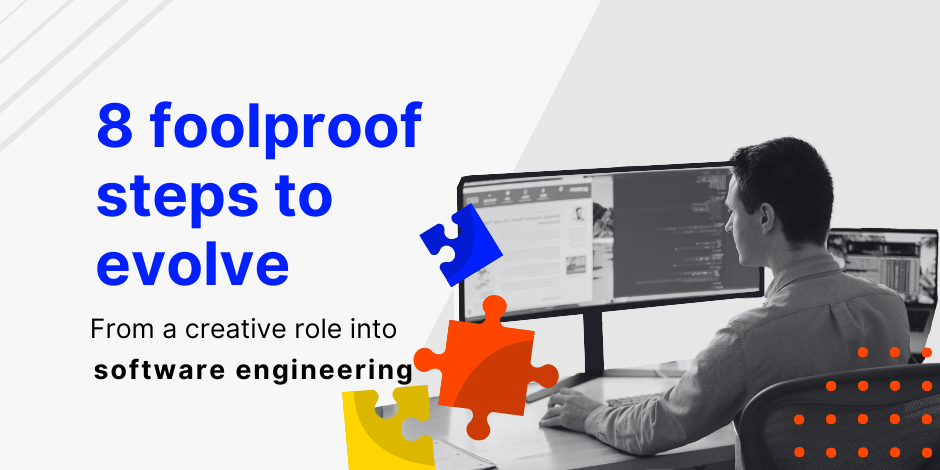8 Foolproof Steps to Transition From a Creative Role Into Software Engineering

Stay Informed With Our Weekly Newsletter
Receive crucial updates on the ever-evolving landscape of technology and innovation.
Do you work in a creative field like writing, photography or music, but have been toying with the idea of a total career change?
You might be surprised to know that you can use your existing work experience to get a foot in the door of the booming tech industry with just a bit of upskilling, particularly when you’re transitioning from a creative role into software engineering.
Plenty of creatives want to make a career change, but just aren’t sure about how to do it. And who can blame them? There are so many things to consider when you’re thinking about swapping one industry for another. And one of the biggest questions to ask is: are your current skills and experience transferable? Or do you have to start all over again from scratch?
Luckily, it is very possible to move from creative roles in the art, design or film world into the lucrative field of software engineering. Here, you can design, build and test the software that runs apps, websites, video games, operating systems and more – which involves more creativity than you may think.
Read on to find out how to get started in software engineering and use your creative background to your best advantage.
Which creative skills apply in software engineering?

While creative workers have an excellent opportunity to land a lucrative job in software engineering, the field can also benefit from individuals from non-standard backgrounds who bring a unique set of transferrable skills and experiences to the workplace. You don’t need to be based in IT either, whether you’re in a creative role or not, you may likely find that lots of your current skill set is applicable.
Here are just a few of the soft skills you might already have, that are in high demand in the software engineering space.
Creative problem-solving
This is a vital skill employers look out for in software engineering – after all, engineering is ultimately about problem-solving using logic, from coding to deployment to fixing bugs. If you’re a lateral thinker, adept at brainstorming or coming up with brilliant ideas, you can really highlight your ability to think outside the box.
This is a key element in software engineering, as large parts of the role will involve identifying problems and troubleshooting ways to improve things.
Communication skills
The ability to share ideas clearly and persuasively cannot be undervalued. If you’ve got writing chops from a role in media, you’ll have a head start as a software engineer when it comes to information architecture, collaboration, reporting and presentation tasks.
Software engineers don’t work in siloes either. They liaise with and support a wide range of departments and stakeholders both internally and externally, right across an organisation. So being able to communicate your thoughts effectively (and sometimes diplomatically) will always put you in a position of advantage, in any software engineering role you take on
Design principles
Having a solid grounding in design concepts is another highly desirable skill in software engineering. Knowledge of elements like colour, balance, pattern, proportion and hierarchy – i.e. how to compose compelling and attractive visuals – is particularly useful in spaces like front-end programming, as well as user experience design.
But it’s not all about graphic design. Software itself consists of several design principles that are considered to be somewhat gospel. These include principles such as:
“Don’t reinvent the wheel”
“Exhibit uniformity and integration”
“Accommodate change”
“Assess for quality”
So having experience in both design principles, and knowing how to apply them in any space, will also serve you well in a software engineering role.
Time management
As a creative, you may be used to working to a strict deadline. This will stand you in good stead in the fast-paced world of programming, particularly if you land in a workplace that uses the agile development cycle.
Most importantly, software engineers need to know how to effectively categorise their priorities. In a field where errors can happen fast and have a lasting impact, it’s essential to be able to recognise the difference between what’s urgent and what’s important. Projects shouldn’t be worked on in a ‘first come, first serve’ basis, but in a way that deals with the most crucial, time-sensitive projects first.
The ability to work in a team
Collaborative work is the mainstay of many creative industries, but it’s also applicable in software engineering too. For example, as a programmer, you might be working on a project from scratch on your own, but with other projects you’ might be collaborating with a team of developers, liaising with external stakeholders, meeting with senior executives to provide project updates, and as your career progresses, even instructing and guiding junior engineers in your team.
Psychology
Concepts in psychology come up all the time in user design and other areas of software engineering. So if your current creative role incorporates any training or experience in the study of the human mind and behaviour, you will likely have a lot to offer in these fields.
Do I need tech experience to be a software engineer?

It can be tricky to land a job at one of the more prominent software companies without any specific technical training because recruiters will assume that more qualified candidates are more likely to excel in the role – but with a willing and curious mindset, the necessary knowledge can be built.
If you’re ready to put in a little effort, you can master technical mumbo-jumbo without years of experience in the field. Online study will bring you up to scratch, giving you a solid understanding of program frameworks and trends in software engineering that will help your creativity bloom in new professional circumstances.
And there are a number of credible courses and certifications (like the Institute of Data’s Software Engineering program) you can undertake to give you the necessary knowledge and experience to get job-ready in as little as 3 months.
The eight steps to landing a job in your new field

So, what are the practical steps you can take in moving from a creative career into your dream role in software engineering?
Learn a programming language
Upskilling by learning to code through an online course is the most valuable investment you can make in your professional future. To get your foot in the door of an interview for a technical role, you will need to know some coding – Python, Java, C, SQL, just start somewhere. There are plenty of resources that will help you decide which language is right for you. Good quality online programs will include pre-work, intensive practical training, industry certification and a job outcomes program in collaboration with industry partners.
Gain an understanding of data structures and algorithms
These days, in the data-driven world, major tech companies consider practical data science training crucial to the successful delivery of their core products. So, whether through a certification or your own learning, make sure you have a grasp of the fundamentals of data structures and algorithms, as these elements do feature in software engineering.
Familiarise yourself with platforms like Github, Bitbucket and SourceForge
In your new role, you’ll be using platforms like these to collaborate with your colleagues. Using these platforms will give you access to some excellent introductory tutorials that are worth checking out before you land in the workplace, as well as a community of passionate, like-minded people who can help you expand and grow your own professional network.
Get some projects under your belt
One thing interviewers often look for (and like to ask questions about) is a solid portfolio of projects you’ve built. This is where you can show off your newly gained knowledge of programming languages, algorithms and databases. And this is where you can have a lot of fun, so get creative!
All our students complete a capstone project during their program, which gives them a tangible way to apply their learning and highlight their experience after graduation – they can even take these projects along to job interviews. Similarly, any projects you create can act as a highlight reel of all your skills and talents, so don’t be afraid to experiment.
Enter coding competitions
Not only is it a great way to learn, entering coding competitions can also help you win badges and certificates that you can add to your resumé. HackerRank, TopCoder and CodeChef are some examples of platforms that host world-renowned coding competitions. This could be a chance for your out-of-the-box thinking to shine.
Don’t forget to network
Making personal connections is essential to getting closer to your dream role. Meeting industry professionals in person aren’t always easy, but get involved in the conversation on Twitter and LinkedIn. You’ll find people are more than happy to help you get to know the industry and send opportunities your way. Another great option is attending seminars and conferences.
Recreate your resumé
It’s time to revamp your CV and resume to angle it for tech opportunities, highlighting your transferrable skills and any relevant learning you’ve done. There is so much growth in the booming tech industry, but you’ve got to present yourself in the right way to give yourself a chance. Try asking some of your new connections if they’ll give you a resumé review.
Stay open-minded
Not every role in tech requires a rigorous background in coding. In fact, over 40 percent of jobs in the software industry don’t require a technical background. Think technical writing, operations management, product support, quality assurance, change management, and user experience research.
Whether or not you’re interested in pursuing a more technical path, consider upskilling with an online course to gain some technical knowledge because it’s always useful to be able to understand what your co-workers are doing.
Go for it
It can feel overwhelming to change your career but it’s truly never too late to start something new. Don’t get caught up in the misconception that you need technical experience to get started.
Conclusion
Job offerings are abundant at the moment, and not every employer requires technical experience, so landing a well-paying, satisfying and flexible job in an industry that treats you with respect is well within your reach. Find out more about how our software engineering program can set you on your course to success.
Get expert guidance on transitioning to software engineering. Book a career consultation for a tailored roadmap to achieve your professional goals in this field.




